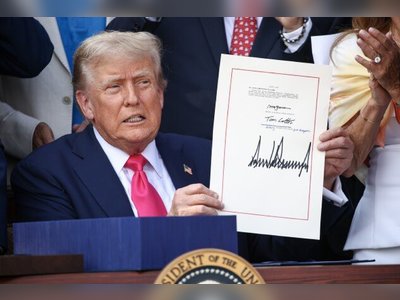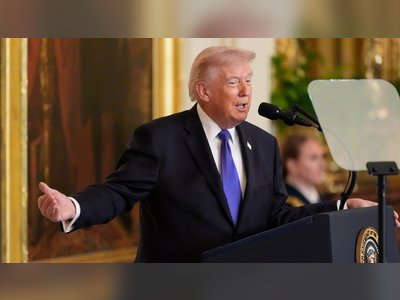
Trump's Policies Prompt Legal Challenges Over Immigration Measures
President Trump's recent executive orders on immigration ignite legal and political debates.
In a series of executive actions, President Donald Trump seeks to fulfill his campaign promises to intensify immigration control and redefine aspects of U.S. immigration law.
These measures, which have already sparked significant legal challenges, mark a resurgence of policies from his previous administration.
On Monday, President Trump declared a national emergency at the U.S.-Mexico border, opening the door for military involvement in border security operations.
This declaration aligns with his strategy to use federal resources to achieve 'complete operational control' at the border, despite a reported reduction in unauthorized crossings in recent months.
A key component of Trump’s orders attempts to revoke birthright citizenship for children born in the U.S. to undocumented immigrants.
This policy, enshrined in the 14th Amendment of the U.S. Constitution, has been in practice for over a century.
Legal experts and civil rights groups have promptly initiated lawsuits, arguing the measure exceeds presidential authority and represents an unconstitutional move.
The American Civil Liberties Union (ACLU) and several state attorneys general have filed suits to challenge these orders, emphasizing the established legal precedent that affirms the citizenship rights of those born on American soil.
Among those taking legal action is a coalition of civil rights organizations representing families who stand to be affected by these potential changes.
Concurrent with these domestic policies, Trump’s administration reinstated the Migrant Protection Protocols, commonly referred to as the 'Remain in Mexico' policy.
This policy requires asylum seekers to wait in Mexico while their cases are adjudicated in the U.S., a procedure that human rights advocates argue places vulnerable migrants at significant risk.
Furthermore, the administration has ceased using the CBP One mobile app, previously implemented under the Biden administration to facilitate scheduled border entries.
This abrupt termination has left many migrants stranded, undermining the legal pathways previously available and increasing reliance on informal and potentially unsafe crossing methods.
In addition to these measures, Trump has restarted the controversial border wall construction and has adopted a hardline stance against so-called sanctuary jurisdictions, proposing to limit federal funding for cities that do not cooperate with federal immigration enforcement.
Critics argue that these actions not only affect the domestic landscape but also threaten global collaborations, particularly with nations whose citizens have traditionally sought refuge in the U.S. Mexico, however, indicated cooperation with the renewed enforcement measures, highlighting the geopolitical complexities of U.S.-Mexico relations.
Trump's administration faces intense scrutiny and opposition as it attempts to implement these policies, with observers anticipating a series of protracted legal battles.
Experts note that while presidents wield considerable executive authority, moves to alter constitutionally protected rights will meet formidable legal barriers.
These measures, which have already sparked significant legal challenges, mark a resurgence of policies from his previous administration.
On Monday, President Trump declared a national emergency at the U.S.-Mexico border, opening the door for military involvement in border security operations.
This declaration aligns with his strategy to use federal resources to achieve 'complete operational control' at the border, despite a reported reduction in unauthorized crossings in recent months.
A key component of Trump’s orders attempts to revoke birthright citizenship for children born in the U.S. to undocumented immigrants.
This policy, enshrined in the 14th Amendment of the U.S. Constitution, has been in practice for over a century.
Legal experts and civil rights groups have promptly initiated lawsuits, arguing the measure exceeds presidential authority and represents an unconstitutional move.
The American Civil Liberties Union (ACLU) and several state attorneys general have filed suits to challenge these orders, emphasizing the established legal precedent that affirms the citizenship rights of those born on American soil.
Among those taking legal action is a coalition of civil rights organizations representing families who stand to be affected by these potential changes.
Concurrent with these domestic policies, Trump’s administration reinstated the Migrant Protection Protocols, commonly referred to as the 'Remain in Mexico' policy.
This policy requires asylum seekers to wait in Mexico while their cases are adjudicated in the U.S., a procedure that human rights advocates argue places vulnerable migrants at significant risk.
Furthermore, the administration has ceased using the CBP One mobile app, previously implemented under the Biden administration to facilitate scheduled border entries.
This abrupt termination has left many migrants stranded, undermining the legal pathways previously available and increasing reliance on informal and potentially unsafe crossing methods.
In addition to these measures, Trump has restarted the controversial border wall construction and has adopted a hardline stance against so-called sanctuary jurisdictions, proposing to limit federal funding for cities that do not cooperate with federal immigration enforcement.
Critics argue that these actions not only affect the domestic landscape but also threaten global collaborations, particularly with nations whose citizens have traditionally sought refuge in the U.S. Mexico, however, indicated cooperation with the renewed enforcement measures, highlighting the geopolitical complexities of U.S.-Mexico relations.
Trump's administration faces intense scrutiny and opposition as it attempts to implement these policies, with observers anticipating a series of protracted legal battles.
Experts note that while presidents wield considerable executive authority, moves to alter constitutionally protected rights will meet formidable legal barriers.












